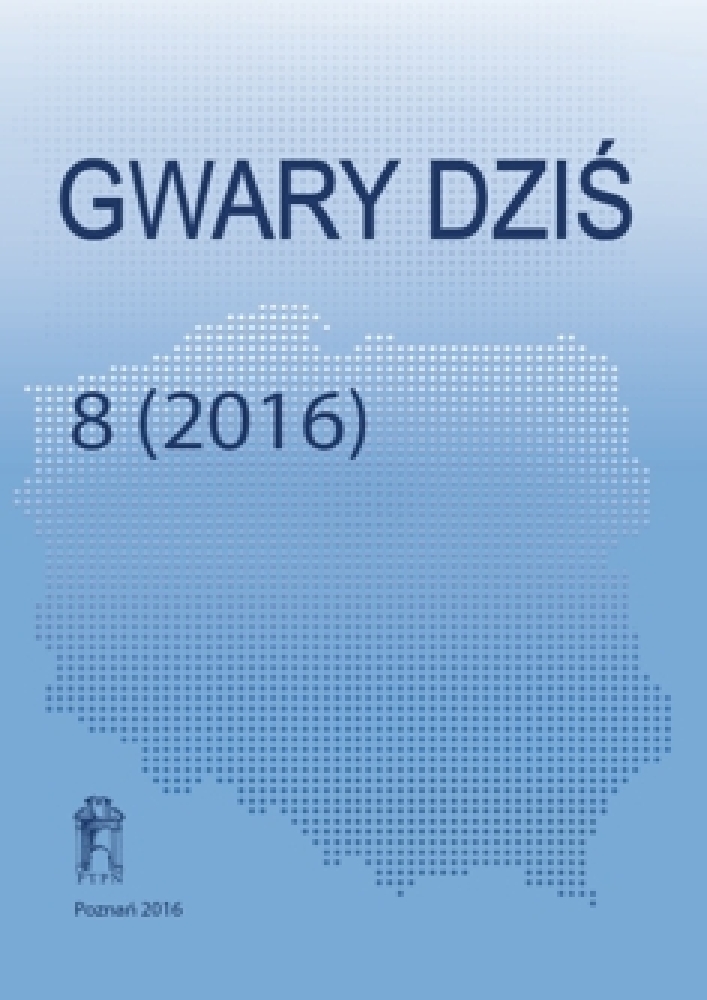Abstract
The goal of this article is to look at the origin of the name Wschowa from a new perspective, taking into consideration the town’s history. Wschowa used to be a gord located on a very significant trade route that connected its lands with Saxony. From the 13th century, most of the residents were immigrants, with a predominance of Germans. Evidence for that can be found in the German name of the city - Frauenstadt (Lady’s Town) which refers to the Virgin Mary. This article consists of three parts: a historical and topographical background, a source material presentation in the form of Polish and German notations and an analysis of the name’s development in a linguistically complex environment. There are many variations of the name Wschowa (e. g. Veschow, Wyschow, Szowa, Uschowa) that differ both in writing and pronunciation. They reflect the fact that Wschowa is a very distorted version of its first form Wyszów. The name *Wyszów (from the word wyszny ‘taller’) refers to the name of the gord that was located on wetlands in the Barycz Valley and situated on an artificial hill with a brick castle.
References
CDL, Codex diplomaticus Lusatiae, I, Gőrlitz 1854.
CS, Codex diplomaticus Silesiae, VI–XXVI, Breslau 1865–1911.
Jungnitz J., Visitationsberichte der Diőzese Breslau. Archidiakonat Breslau, Oppeln, Liegnitz, Glogau, I–III, Breslau 1902–1905.
KDW, Kodeks dyplomatyczny Wielkopolski, red. I. Zakrzewski, I–III, Poznań 1877–1880.
NMP, Rymut K., Nazwy miejscowe Polski, Wrocław–Warszawa–Kraków–Gdańsk 1980.
SG, Słownik geograficzny Królestwa Polskiego i innych krajów słowiańskich, XIV, 2, pod red. H. Sulimirskiego i B. Chlebowskiego, Warszawa 1895.
SU, Schlesisches Urkundenbuch, II–VI, Wien–Kőln–Graz 1977–1998.
Bańkowski A. (1984), Wątpliwe lekcje nazw miejscowych i wodnych w Bulli gnieźnieńskiej, Zeszyty Naukowe Wydziału Humanistycznego. Filologia Polska. Prace Językoznawcze X, s. 183–189, Gdańsk.
Braune A.G.W. (1889), Geschichte der Stadt Frauenstadt, Frauenstadt. DOI: https://doi.org/10.1515/bgsl.1889.1889.14.369
Lubaś W. (1968), Nazwy miejscowe południowej części dawnego województwa krakowskiego, Wrocław–Warszawa–Kraków.
Lutterer I. (1984), Miejsce etymologii w pracy onomastycznej, „Zeszyty Naukowe Wydziału Humanistycznego. Filologia Polska. Prace Językoznawcze” X, Gdańsk, s. 21–25.
Machek V. (1957), Etymologický slovnik jazyka českého a slovenskěho, Praha. Malec M. (2003), Słownik etymologiczny nazw geograficznych Polski, Warszawa.
Nowacki J. (1964), Archidiecezja poznańska w granicach historycznych i jej ustrój, Poznań.
Nowakowski J. (1994), Wschowa i Ziemia Wschowska w dawnej Polsce: (do roku 1793), Białystok.
Pudełko J. (1964), Działka lokacyjna w strukturze przestrzennej średniowiecznych miast śląskich XIII w., „Kwartalnik Architektury i Urbanistyki”, z. 2., 125–211.
Ratajewska B. (2007), Kalendarium dziejów Wschowy, Wschowa.
Rospond S. (1950), Ze studiów nad polską toponomastyką VI. Wschowa, „Język Polski”, XXX, nr 1, 5–9.
Weyman S. (1953), Zagadnienie dróg w Wielkopolsce od X do XVIII w., „Przegląd Zachodni”, nr 6–8, 194–248.
Wróblewska G. (1954), Mury obronne Wschowy, „Przegląd Zachodni”, nr 11–12, 583–599.
Wróblewska G. (1970), Wschowa, [w:] Studia nad początkami i rozplanowaniem miast nad środkową Odrą i dolną Wartą, pod red. Z. Kaczmarczyka i A. Wędzkiego, Zielona Góra.
Zierhoffer Z., Zierhoffer K. (1987), Nazwy miejscowe Wielkopolski, Poznań.
License
Copyright (c) 2019 Stanisława Sochacka

This work is licensed under a Creative Commons Attribution-NoDerivatives 4.0 International License.
Authors
Authors of texts accepted for publication in „Gwary Dziś" are required to complete, sign and return to the editor's office the Agreement for granting a royalty-free license to works with a commitment to grant a CC sub-license.
Under the agreement, the authors of texts published in „Gwary Dziś" grant the Adam Mickiewicz University in Poznań a non-exclusive, royalty-free license and authorize the use of Attribution-NoDerivatives 4.0 International (CC BY-ND 4.0) Creative Commons sub-license.
The authors retain the right to continue the free disposal of the work.
Users
Interested Internet users are entitled to use works published in „Gwary Dziś" since 2016 under the following conditions:
- attribution - obligation to provide, together with the distributed work, information about the authorship, title, source (link to the original work, DOI) and the license itself.
- no derivatives - the work must be preserved in its original form, without the author's consent it is not possible to distribute the modified work, such as translations, publications, etc.
Copyrights are reserved for all texts published before 2015.
Miscellaneous
Adam Mickiewicz University in Poznań retains the right to magazines as a whole (layout, graphic form, title, cover design, logo etc.).
